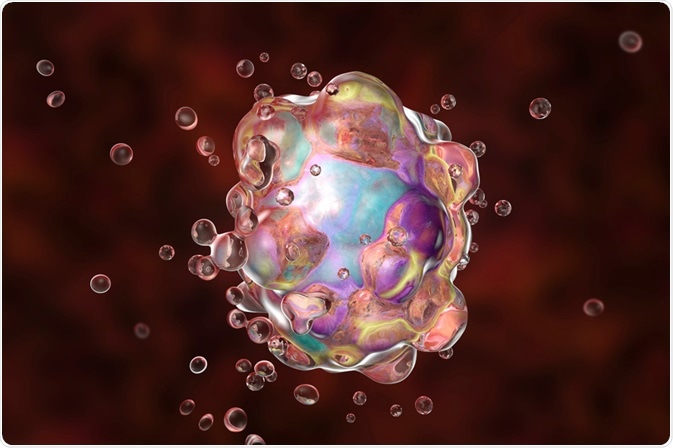What is p21?

Image Credit: Kateryna Kon/Shutterstock.com
Cyclin-dependent kinase inhibitor 1, also known as CDK-interacting protein 1, or more simply as p21, is a cell cycle inhibitor that promotes both CDK/cyclin inhibition as well as cell cycle arrest during the G1/S phase. In humans, p21 is encoded by the CDKN1A gene on chromosome six.
Studies have demonstrated p21’s use as a target of p53 activity, and have implicated it in the regulation of the cell cycle, apoptosis, and transcriptions. Therefore, studying p21 can help uncover cell processes following DNA damage.
Also, continued research has begun building a wealth of knowledge regarding the vital roles of p21 expression and activity, linking it to the establishment and development of cancer. For this reason, the future of research into p21 is likely to be a focus within oncology, in the exploration of potential novel therapies that could be developed from our growing knowledge of p21.
Functions of p21 in the cell cycle, apoptosis, and transcriptional regulation
P21 is implicated in numerous functions related to cellular processes, particularly those following damage to DNA. Cell cycle arrest is a significant point of the cell cycle, a stopping point at which the cell is not involved in duplication or division activities.
It may have a role in aging and disease due to the senescent, proinflammatory, prosecretory, cellular phenotype it generates. P21 has been found to promote cell cycle arrest following activation from various stimuli. It is known to inhibit the cell cycle progression, leading to cell cycle arrest. A major cause of p21 activation leading to this outcome is the presence of damaging agents.
Regulated cell death, known as apoptosis, is essential for ridding the body of potentially cancerous or virus-infected cells, maintaining balance in the body by removing old cells, and also plays a vital role in embryogenesis.
P21 is thought to be essential to the execution of apoptosis, as well as its inhibition. Studies have shown that it is cleaved by CASP3-like caspases, activating CDK2, and initiating the process of apoptosis. However, it has also been seen that p21 may inhibit apoptosis through its activation of cell cycle arrest and DNA repair.
P21 has been observed to play a crucial role in transcriptional regulation. Studies have shown that DNA damage can induce p21 activity, which can have both positive and negative effects on transcriptional regulation.
The activation of p21 can inhibit the cyclin-CDK complexes, therefore, repressing transcription by inhibiting the phosphorylation of pRb, which has a repressive effect on E2F-dependent gene transcription.
Finally, research has uncovered that p21 is also vital to the cellular processes of differentiation, senescence, and DNA repair in addition to playing a vital role in cell cycle arrest, apoptosis, and transcriptional regulation.
P21 and cancer
All of p21’s roles in cellular function are related to its mediation of cancer. This is because p21 governs, at least in part, all vital cellular functions, all of which are implicated in the establishment, progression, and therapeutic response of cancerous cells.
Given that p21 has been implicated in cell cycle arrest it is unsurprising that scientists have exploited its function to treat cancer. Some chemotherapeutic agents have been designed to induce p21 activity to have the effect of inhibiting cancer progression.
P21 has an inhibitory effect on CDK2 activity, which, in turn, inhibits cell cycle progression. Through activating p21, and inhibiting CDK2, researchers have recognized the therapeutic potential of targeting p21 to prevent the proliferation of cancer cells.
Breast cancer, in particular, has been linked with p21’s impact on the regulation of gene transcription. The expression of the estrogen receptor-α (ERα)-dependent gene is mediated, at least in part, by p300–CREBBP-driven gene transcription, which is activated by p21.
Differentiation of ERα-positive cells is induced by this activity, and therefore, the upregulation of p21 can prevent the growth of ERα-positive breast cancer cells. This discovery has alerted scientists to the impact that p21 can have on the efficacies of anti-estrogen treatments.
One hallmark of cancer is its strong ability to avoid apoptosis, allowing cancer cells to thrive in spite of the body’s efforts to initiate regulated cell death processes.
P21 has been considered both a help and a hindrance in cancer progression, on one hand, it has been targeted to stimulate cell cycle arrest to inhibit cancer progression, but on the other, it has been associated with apoptosis inhibition, a condition that allows cancer to thrive. P21 can protect cells from apoptosis by promoting cell cycle inhibition, and cells that are not active are less likely to trigger apoptosis.
Conversely, p21’s role in DNA repair once again sees it in a helpful role to prevent cancer progression. Because p21 inhibits cell cycle progression as well as apoptosis, DNA repair can proceed during this pause in the cycle. DNA repair is vital to protecting against cancer, and therefore p21 may contribute to tumor-suppressing activities, although further research is needed to confirm this.
Summary
P21 is a cell cycle inhibitor that is involved in essential cellular processes such as cell cycle arrest, apoptosis, and transcriptional regulation, as well as differentiation, senescence, and DNA repair. Because of its role in these processes, a large body of research has studied its role in cancer initiation, progression, and response to therapy.
Currently, the evidence shows p21 to be related to tumor-suppressing activities as well as, paradoxically, tumor-promoting activities. More research is needed to understand p21’s role in cancer, which may lead to the development of new therapeutic techniques.
Sources:
Abbas, T. and Dutta, A. (2009). p21 in cancer: intricate networks and multiple activities. Nature Reviews Cancer, 9(6), pp.400-414. https://www.ncbi.nlm.nih.gov/pmc/articles/PMC2722839/
Karimian, A., Ahmadi, Y. and Yousefi, B. (2016). Multiple functions of p21 in the cell cycle, apoptosis and transcriptional regulation after DNA damage. DNA Repair, 42, pp.63-71. www.sciencedirect.com/science/article/pii/S1568786416300477?via%3Dihub
Montero, J. (2019). p21: One protein to rule cell fate. Science Translational Medicine, 11(499), p.eaay3568. https://stm.sciencemag.org/content/11/499/eaay3568
Shamloo and Usluer (2019). p21 in Cancer Research. Cancers, 11(8), p.1178. https://www.ncbi.nlm.nih.gov/pmc/articles/PMC6721478/
Further Reading
Last Updated: Feb 3, 2020